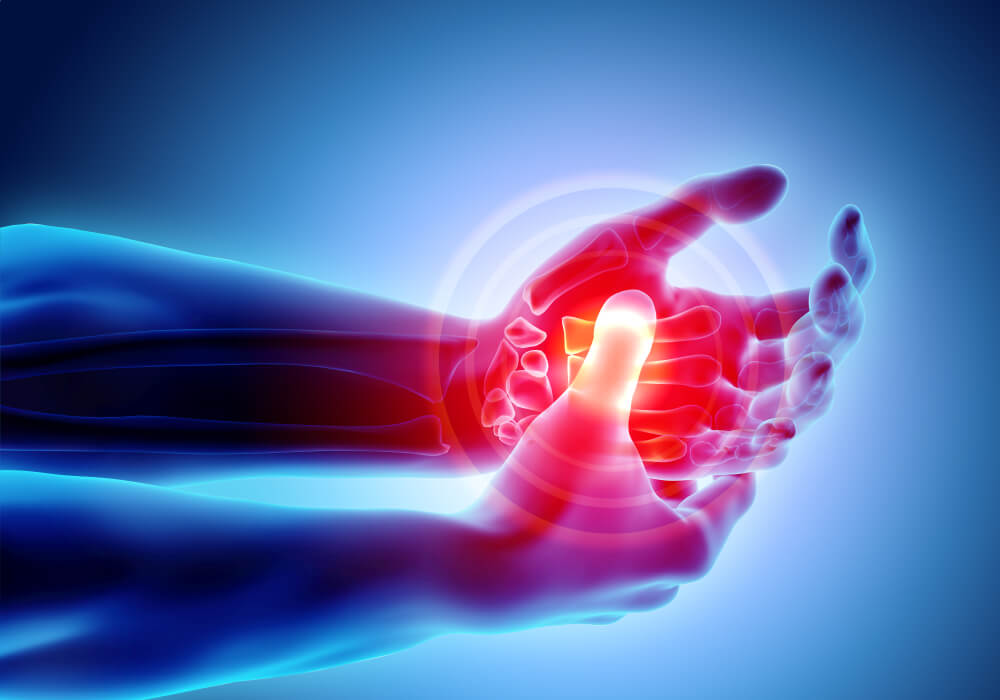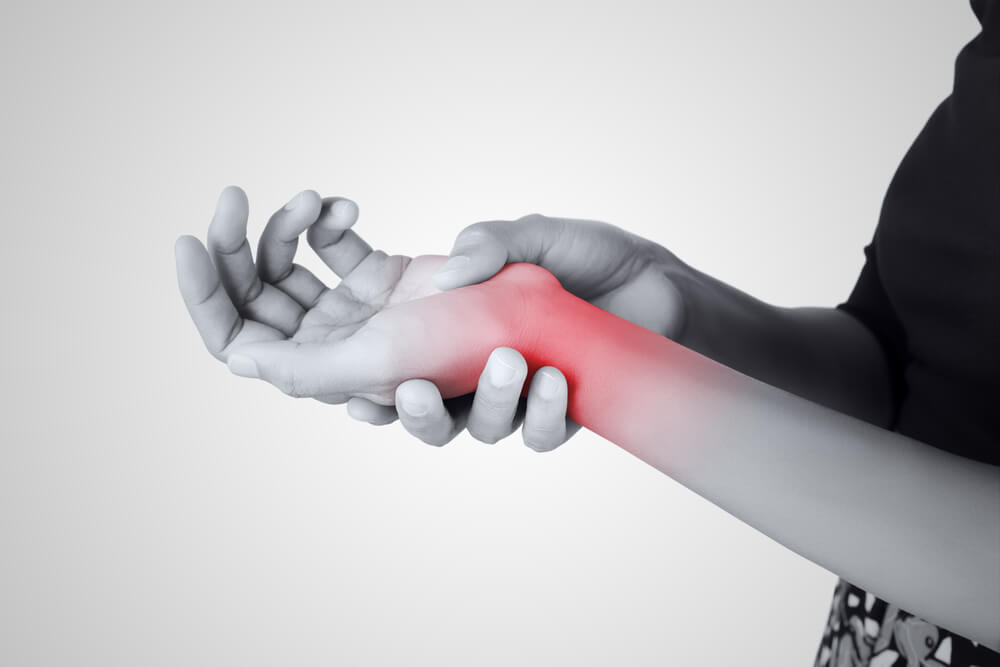
Nerve pain is due to problems with the signals from the nerves. Nerve pain due to an injury is known as nociceptive pain. However, nerve pain that is caused by disease or damage affecting the nervous system is called neuralgia or neuropathic pain. Neuropathic pain is caused by a problem with the nerves, sending pain messages to the brain.
Nerve Pain Symptoms
Nerve problems can cause a variety of symptoms, often these are described as shooting pain, stabbing, burning, aching or electric shock sensations. Mild symptoms may be due to an inflamed nerve which is sending out normal pain signals. However more severe symptoms are due to a nerve which is blocked or compressed. Some examples of mild vs. more severe symptoms include:
Mild Symptoms
- Pins and needles
- Burning
- Pain
- Increase sensitivity
More Severe Symptoms
- Weakness
- Numbness
- Paraesthesia
- Poor reflexes
The Causes Of Nerve Pain
There are many conditions which can cause nerve pain. Some of the common causes include:
- Injury
- Sciatica
- Carpal tunnel
- Diabetes
- Shingles
- Cancer
- Multiple sclerosis
- Alcoholism
- Nerve disorders
Pinched Nerve
A ‘pinched nerve’ is a layman’s term for a common nerve problem. This can be mild, due to irritation of the nerve or more severe due to compression. One of the most common nerves associated with this type of problem is the sciatic nerve.
In more severe cases the sciatic nerve can get pinched due to a disc protrusion, ligament swelling or an arthritic spur. It can also be irritated by simple day to day activities even in the absence of significant structural problems. Both scenarios can cause referred leg pain, commonly known as sciatica with the more severe situations causing nerve pain, muscle weakness, poor reflexes or sensory loss.
Nerve Pain Treatment
There are many causes of nerve pain and your physio will first determine the cause of the problem. Your physio will be able to identify where your nerve problem is coming from by assessing your symptoms. Treatment will begin with a thorough assessment and examination, including your history, to determine the cause and severity of your condition. You may be referred for further tests if needed, including an X-ray, CT scan or MRI to evaluate the severity of the injury.
Can Physio Help With Nerve Pain?
Physiotherapy for nerve pain is a common treatment option that works to achieve results in reducing pain, minimising discomfort, and optimising mobility and flexibility. Nerve pain treatment is typically a very effective component of physiotherapy intervention. Physio for nerve pain is successful in bringing nerve pain relief due to nerve irritation or compression. Depending on the area of the body that is involved, expect the following physio treatments:
- Spinal mobilisation: this treatment involves manual mobilisation or in some cases manipulation of the spinal joints to achieve better flexibility and mobility of the neural tissue. The process involves the release of restrictive muscles and joints that are causing pressure on nerves and limiting movement. This kind of treatment often has a desensitising effect on the local neural tissue to calm a patient’s symptoms.
- Dry needling: a therapy that involves the insertion of thin acupuncture needles into the relevant muscles. This treatment can reduce tension in the muscles and restore normal muscle function and range of motion. Dry needling can be effective in pain relief and allow relief of specific nerve-related issues.
- Massage therapy: one of the most well known techniques of pain management and addressing issues in the nervous system. Applying targeted pressure to soft tissue and muscles and combining various techniques such as kneading, friction, compression, and vibration are all effective in alleviating immediate symptoms of nerve pain, while also serving to increase flexibility and overall mobility.
- Exercises for joints, muscles, ligaments, and tendons: physio for nerve pain in the leg is often best treated with controlled and targeted exercise routines that strengthen and optimise muscle function. Speak to your physio about developing an exercise program that will focus on conditioning and pain relief.
- Stretching: along with exercise, stretching should be part of any daily treatment routine for nerve pain, especially in the legs. Stretching after exercise is important because the muscles are warm before applying stretch or pressure to them – much more effective when putting them into higher stress positions.
- Education to minimise pressure and irritation: physiotherapy aims to educate and change certain lifestyle habits that may be contributing to the source of pain. Reducing alcohol or caffeine intake are examples of lifestyle changes that may be causing or exacerbating symptoms of nerve pain.
Mild To Moderate Nerve Pain In Leg Treatment
Nerve pain can often be ‘focused’ in the leg. This is because major nerve pathways originating in the lower back such as the Sciatic Nerve travel through the legs into the calves and feet. Any irritation or compression occurring up in the spine or lower back can trigger pain that radiates into the lower legs causing pain and discomfort. Treating nerve pain in the leg will often involve the following methods:
- Apply heat to relieve pain: using a heat pack – gently apply to the affected area to relieve pain. You may find one location works better at relieving symptoms. Stick to this method going forward or ask your physiotherapist to guide you once you better understand your condition. Nerve pain travels, sometimes the location that requires treatment is not where you might think.
- Medication and painkillers: prescribed over the counter medications can be very effective in pain relief but should always be taken alongside other treatment methods such as physiotherapy (including specific exercises) to avoid dependence and other side effects.
- Controlled leg stretches: performing light and simple stretches from your physiotherapist will help relieve tightness and discomfort over the long term and help with recovery.
- Aerobic exercises: building strength throughout the course of any treatment program will be beneficial especially once pain and other symptoms have subsided. Speak to your healthcare professional for advice on specific exercises to combat nerve pain in the leg.
Severe Nerve Pain In Leg Treatment Options
Severe cases of nerve pain may result in the need for surgery for a comprehensive solution to the issue. While this is usually the last option on the list of treatments, surgery can be effective if other treatment methods are failing. Making the decision to opt for surgery is always a difficult one. It will normally be on the advice and in consultation with a medical professional and involves a higher level of risk. Treating severe nerve damage in the leg with surgery should be done with consideration of other lifestyle factors that could change as a result. Cost and other factors will always play a role in the final decision. Remember, the severity of your pain is not always consistent with tissue damage so the direction of treatment should always be considered carefully in consultation with your physiotherapist or medical professional. An understanding of the cause of your pain is important in making the best decision.
Other Nerve Pain In Leg Treatment Options
Sometimes mild nerve pain symptoms can be eliminated with a few simple changes involving some of the following methods:
- Diet: eating right is good for your body on so many levels. Mild nerve pain can be the result of nutritional deficiencies and these can easily be fixed by changing up your diet. Eating a balanced, fresh diet built around vegetables, fruits, whole grains, healthy fats, and proteins will mean you’re receiving a range of important antioxidants and fibres.
- Vitamin intake: knowing if you have certain deficiencies, such as iron or vitamin B will go a long way in ensuring your body has all the tools available to tackle nerve issues.
- General exercise: Often our hectic lives meant this gets pushed to the back of the queue. Simply getting out for a walk three times a week for 30 minutes can be effective in reducing nervous system sensitivity.
Physiotherapy for nerve pain is critical in ensuring the right treatment, exercises and stretches are completed in the appropriate time frame. To get more advice about nerve pain, contact the friendly staff at Integrity Physio Como.



